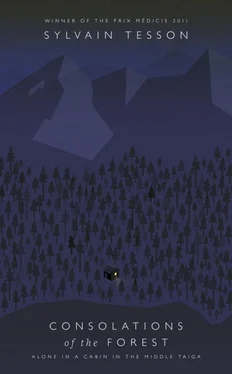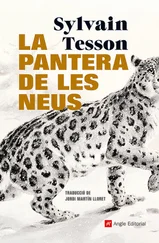I’m at 3,280 feet, on the edge of the ridge. Sitting on a branch of dwarf pine, leaning back against a boulder, dangling my legs over the drop with a stand of golden larches far below, I watch the morning mist reach the lakeshore. Its billowy wave flows up against the lower edge of the forest. I love mist, that incense of the earth. I trim a Partagás. A lover of Havanas enjoys surrounding himself with smoke. Offerings in an inoffensive sacrifice, the puffs bind men to the gods. Every smoker dreams of disappearing into his own cloud.
4 MAY
The snows of yesteryear returned to the land today. A sidecar motorcycle appears on the northern horizon and stops at my shore. The dogs don’t bark: not a good omen regarding their ability to warn me about approaching bears! It’s Oleg, a fisherman I’ve met once or twice. He’s travelling from Elohin to Zavorotni on an ageless Ij Planeta 750, a machine from the 80s that’s better than the Ural 650 but lacks the chic of a military sidecar bike, as Oleg readily admits.
The vodka’s good, snow is falling and Oleg has brought cucumbers. We slice them thinly, and crunch one up with each glass. Oleg hasn’t talked to anyone for a while.
‘When I think that I was afraid of capitalists, but you, you’re really nice. You have to come to Elohin more often. We’re going to drive on the lake for another two weeks before it starts opening up everywhere and we can’t take a step any more without risking a pratfall. The ducks and geese will arrive, you’ll see: one morning, there they’ll be, back from China or Thailand or some other fucking paradise. Once some geese landed at my place, near the lake, and made a nest in my canoe. A few hunters showed up and wanted to blow their heads off. I told them, just try and I’ll punch your faces flat. I don’t like having birds asleep in my boat shot at. Last year, I found a baby seal beached on the pebble shore and I fed it all summer long.’
I imagine Oleg with his huge mitts feeding the little animal from a bottle. Earlier, when the bike was heading here, I thought: Please let this bastard destroying my silence go on his way. And here we are, two brothers polishing off a bottle.
‘By the way,’ he says, ‘Irina sends you this little packet of yeast.’
We’ve put paid to a litre of poison. Oleg takes off, I collapse on my bed.
5 MAY
Buryatia hands over the sun at 6.30 a.m.
Yeast changes everything with blini.
The dogs have declared war on the wagtails.
A thin layer of snow makes the lake look like the world’s largest salt flat.
It takes me three minutes to chop into firewood one of the pine log sections Sergei chainsawed three months ago.
It’s 14°F at night and barely above freezing during the day.
Birch bark makes better tinder than dry moss.
The black dog stands out starkly on the ice. In the summer, she’ll still be the one easiest to spot on the light grey lakeshore.
To sharpen the axe, a smooth stone patiently rubbed along the edge is enough.
The fish position themselves naturally at the very bottom of the fishing holes.
Vodka diluted with water makes a decent window cleaner.
It’s stupid to hang the hurricane lantern from the cabin ceiling the way I did yesterday: the beams could have caught fire.
There is pleasure in keeping one’s home in order.
Cooking char en papillote without either scaling or gutting them intensifies the flavour of the fish.
At seven o’clock, the dawn light touches my table; at two in the afternoon, the foot of my bed; at six, the sun drops behind my peaks.
Not one insect has awakened yet.
It’s at the fifth glass of vodka that resisting the next one becomes difficult.
Having little to do prompts one to pay attention to everything.
Those are the findings of today’s inquiry.
6 MAY
Ice is the timekeeper. Spring will soon deliver the coup de grâce . Water has invaded the surface, carving it into countless vertical ruts, as if the ice were being eaten by worms. I must watch for the day when it breaks up into myriads of crystal bread sticks. The pitted surface no longer presents that lovely obsidian mirror, as sleek as metal. The mother-of-pearl crunches underfoot.
I take endless walks, flanked by Aika and Bek. I come and go, from one cape to another, and the crows cackle at each round trip.
7 MAY
There are six catfish caught in the trap, making this overcrowded net in the frigid water a nightmare. I understand why so many cultures consider this fish a demonic being. Catfish have maws like Chinese monsters and slimy yellow and greenish-bronze bodies… They’re somewhat like Tolkien’s Gollum. I release four and keep the two biggest, which I kill with a blow just behind the skull. Even the dogs don’t dare approach their flaccid bodies. Ah, the intense pleasure of giving a creature back its freedom! I mentally salute Commander Charcot, a polar scientist who opened the cage door for his gull before sinking off the coast of Iceland in 1936. On the wooden table at the beach, I gut the fish, then stuff the stove with wood to cook them. The flesh of catfish is elastic, with a strong taste some find pleasant, others slightly nauseating. There are many ways of dealing with it, but the best is to dredge it in flour and crumbs so that the greasy fried coating masks the muddy flavour. (The English fry everything they get their hands on in breadcrumbs, and I still recall the oily newspaper pages we had for napkins at a fish and chips place in Brighton.) I prepare a stew for the little dogs, saving a delicacy for myself: pan-fried catfish liver in a splash of vodka.
Months of devouring fish have produced a metamorphosis in me. My character has become lacustrine, more taciturn, slower, and my skin is whiter. I smell like scales, my pupils are dilated, my heart beats at a gentler pace.
A long walk on the lake to Middle Cedar Cape. The wind carries an odour of damp wood far and wide; temperatures slightly above freezing have released the perfume of the taiga. Spring is still only a frisson, but in the usual cold sky, the sun marks a hot spot. The water in the ice faults has melted. Whenever one of them is too wide, the dogs won’t cross it. I take one in my arms, leap over the divide, then return for the other pup, who begs in faint whimpers not to be abandoned.
At Middle Cedar Cape, a ruined cabin. A man hid out there until the collapse of the Soviet Union, in 1991. Every time the KGB came around, he fled into the mountains for a few days until the danger passed. I couldn’t find out whether he was a dissident or a deserter. Today there’s only a hut with a caved-in roof. When I step inside it, I think about that guy. After Yeltsin came to power, the fellow returned to Irkutsk and promptly died there. I would have liked to have met him; he would always have been welcome in my cabin. In the wreckage of the beams, I find a cup and the base of an oil lamp.
In Russia, the forest holds out its branches to the shipwrecked. Yokels, nonentities, bandits, the pure of heart, rebels, those who can bear to observe only unwritten laws – they all head for the taiga. A forest has never refused anyone asylum. As for the princes, they used to send their woodcutters to chop down the trees. To govern a country, the rule is to clear the land. In an orderly realm, the forest is the last bastion of freedom to fall.
The State sees everything; in the woods, life is hidden. The State hears everything; the woods are a vault of silence. The State controls everything; here, only the immemorial codes apply. The State wants submissive subjects, pinched hearts in presentable bodies; the taiga loosens up souls and returns men to the wild. Russians know that the taiga is there if things go wrong, it’s an idea anchored in their collective unconscious. Cities are temporary experiments, provisional experiences that the forests will one day reclaim. To the north, in the vastness of Yakutia (a territory larger than Argentina), this digestion has already begun. Out there, the taiga is retaking coal-mining cities abandoned at perestroika. In a hundred years, there will be nothing left of these open-air prisons but ruins buried under foliage. A nation prospers through the substitution of populations: men replace trees. One day, history turns around, and the trees grow back.
Читать дальше












